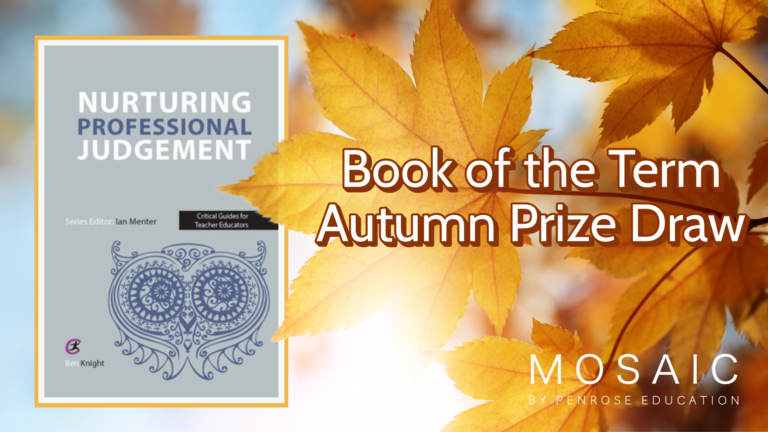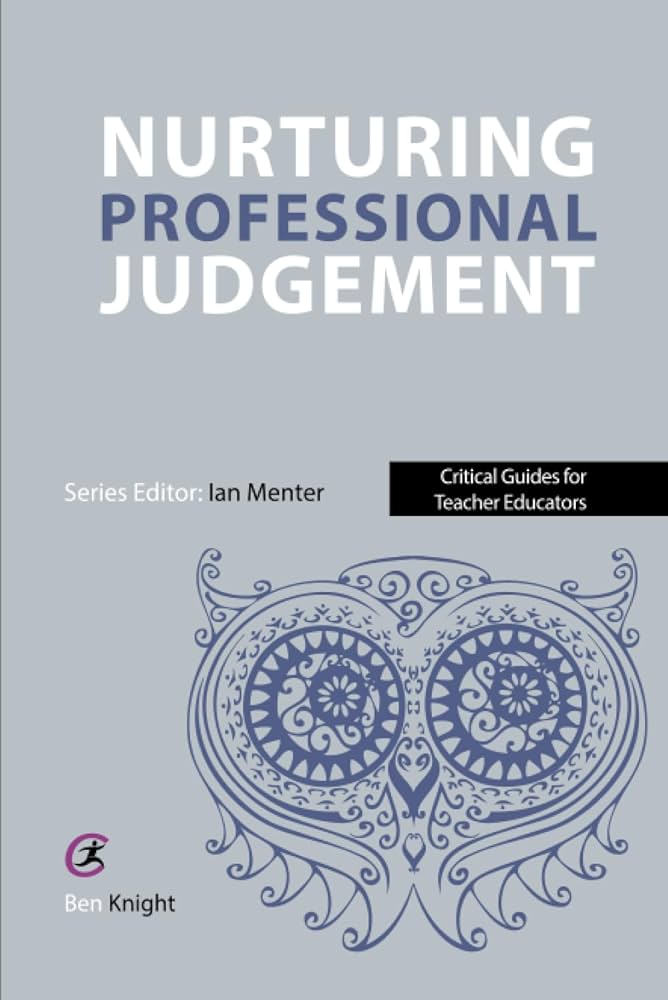Mosaic Book of the Term Prize Draw
Autumn 2024

Written by Rob Caudwell, Co-Founder of Penrose Education
30 September 2024

At Penrose Education we are on a mission to fill the (teacher development) world with thoughtfully designed and effective EdTech. But we also want to fill the (teacher development) world with books.
Each term we will be reviewing a book we have found helpful, interesting and/or thought-provoking in our attempts to develop our understanding of what exceptional teacher training, education and professional development looks like.
Best of all – you could win a copy of one of these books in our Book of the Term Prize Draw!
Our chosen book this term is: Nurturing Professional Judgement, by Ben Knight.
Why we chose this book?
At Penrose Education, we are delighted to have a partnership with Critical Publishing. They produce an excellent series of books called “Critical Guides for Teacher Educators” which I have so often found helpful for both shaping and challenging my thinking on teacher training, education and development. One of their latest additions to this series is this fantastic book by Ben Knight.
In initial and early teacher training/education, there is an (understandable!) pressure to ensure that the beginning teachers we work with are ready to be ‘effective’ in the classroom as soon as possible. There can be a temptation to prioritise covering all the ‘learn thats’ and ‘learn how tos’ underpinning our curriculum, at the expense of anything else. A case of ‘here’s a list of what you need to know and be able to do to survive in the classroom’.
Knight doesn’t disagree that the above is important, but in his book, he offers another perspective to consider when designing our courses. While there is no doubt that a teacher training/education programme must cover key knowledge and afford opportunities for developing classroom practice, we also need to prepare trainees and early career teachers for the fundamental skill of ‘professional judgement’. The classroom is an inherently complex and often unpredictable environment. A significant part of successful teaching depends on being able to handle uncertainty and make decisions in situations where there isn’t an obvious ‘best’ choice of action.
It would be easy to say that we can worry about ‘professional judgement’ later, once a new teacher has learnt the basics and found their feet. But Knight makes a thoroughly convincing case for why – at least in small doses – we should be exposing trainee teachers to this fundamental aspect of being a teacher. This book will be an interesting and thought-provoking read for anyone who works with trainee or new teachers, which is why we’ve chosen it as our book of the term.
If you don’t win, you can always buy a copy from Critical Publishing here!
"[P]rofessional judgement cannot be taken for granted from trainee and novice teachers; it must be nurtured. Teachers at all career stages must be both permitted and sufficiently accomplished to take up that mantle of agency and to act upon it."
- p 72
What we've taken from it
The book is centred on a premise that the classroom is a complex place and learning is a complex process. In chapter 3, Knight outlines the variety of ways that classrooms are – or can quickly become – unpredictable and uncertain places. While he outlines some of the things teachers and schools can do to attenuate this complexity, he also argues that ultimately learning to live with complexity is always going to be a fundamental part of what it means to be a teacher.
The first thing that I’ve taken from the book, is the clear conclusion that to survive – and thrive – in the classroom, a teacher needs to expect and be prepared for the complexity and unpredictability they will encounter. If we are convinced that the classroom is inherently hard to predict and control, then the role of a teacher will inevitably involve occasionally responding to the unexpected. Knight describes ‘professional judgement’ as a combination of related skills and strategies that can help navigate and manage this complexity.
"The reason judgement is so pivotal to classroom teaching is because classrooms and the teaching and learning within them are complex. If classroom dynamics, interactions, content and learning only changed in response to teachers' design, then the business of teaching would be far more straightforward and require far lass judgement; predetermined structures and plans would do the job quite nicely. It is because classrooms are to some extent self-organising systems, with minds of their own we might say, that judgement is integral to successful teaching."
-p33
"Understanding and thinking about the classroom as a complex system and learning a complex phenomenon can help teachers to appreciate the possible consequences of their decisions and actions, intended or otherwise. It can also help them to see failures (eg difficulties pitching activities appropriately, apparent lack of learning, disruptive behaviours) as to some extent inevitable, but also as problems with multiple causes requiring multiple solutions."
- p 32
The book focuses on what implications the inevitability of complexity should have when working with trainees and novice teachers. Knight explores what role ‘professional judgement’ could play in preparing new teachers for a career in the classroom.
It can of course be helpful to temporarily shield trainees/novices from the fulness of the complexity they face in the classroom – teaching is daunting enough already! Many ITTE programmes do an excellent job of gradually increasing the responsibility placed on their trainees, and providing scaffolds/instructions to help trainees to feel increasingly confident in the classroom.
Knight by no mean disagrees with this sentiment. An ITTE programme is only going to help train/educate new teachers, if it can help trainees to feel comfortable and successful in the classroom. But Knight does think it is a mistake to pretend that the complexity described above doesn’t exist. If new teachers are being told (or simply being given the impression) that the classroom is a totally predictable and controllable environment – what happens to these teachers when they are faced with the much more complex reality of an actual classroom?
We of course need to carefully plan how our trainees will take their first professional steps into the classroom. But, in the long-term, future teachers need to be prepared to handle the complexity and unpredictably they will sometimes face, not simply to be protected from it.
A second, and related, takeaway from the book is Knight’s conclusion that developing ‘professional judgement’ can’t be something we just hope eventually happens. We should explicitly plan for its development in our teachers. If we are convinced by Knight’s argument that ‘professional judgement’ is a fundamental part of being a teacher, then we surely must include it in our planning for how new teachers are trained and educated. ITTE programmes cannot just focus on what trainees need to know and be able to practically do in the classroom (though of course these are important!), they also need to include training and education on what to do when things don’t go to plan, when the unexpected happens or when there isn’t an obvious best course of action.
Chapters 4 and 5 are full of suggestions and examples of how we can help novice teachers to begin honing their ‘professional judgement’ muscles. Running through many of the recommendations are the themes of supported reflective practice and permission to practice making judgements.
Knight argues that we should be providing new teachers with plenty of guided opportunities to reflect on the complexity of the classroom. This might take the form of mentors articulating their decision making processes, or trainees being explicitly shown that there is often more than one possible ‘reasonable’ choice of what to do in a specific situation. What’s important is that trainees are given the clear and consistent message that the classrooms are not so predictable that we can reliably say what is the ‘single right approach to any given teaching and learning situation’ (p68).
"[E]xperts are self-regulatory, whereas novices - who are the focus of this book - require degrees of external regulation in the form of questioning, reflection and reality checks to encourage the development of professional judgement. This book is predicated on the assumption that the skills and dispositions associated with professional judgement do not simply develop on their own."
- p 1
Knight also believes that we should look for opportunities for novice teachers to experience what it is like to use ‘professional judgement’ in the classroom. A lot of emphasis in ITTE programmes is understandably put on learning specific things and practicing specific elements of teaching. But we should also find safe ways to explicitly allow trainees to make some of their own decisions about what happens in a classroom. These trainee-led decisions might mean that things go wrong or don’t work, but new teachers won’t learn how to make judgements if they aren’t allowed to try!
"This means acknowledging that there is no silver bullet or single right approach to any given teaching and learning situation. It means reinforcing the idea that a range of reasonable choices can be made and that choosing the most appropriate will be a question of judgement guided by multiple domains of knowledge."
- p 68-69
"[W]ithin what is realistic from a school point of view, a successful mentor will allow for as much autonomy as the trainee or novice can make productive developmental use of, without experiencing detrimental failures or compromising pupils' education in the medium to long term."
- p 59
The third thing that I appreciated about this book is that Knight is also realistic about the likely restraints on attempts to build ‘professional judgement’ more explicitly into how we develop new teachers. As someone who has worked in teacher training and education for over 15 years, Knight is realistic about what is possible in an ITTE programme.
Knight appreciates that trainees are learning to teach in real schools with real pupils. He is clear that all attempts to allow new teachers opportunities to make their own ‘judgements’ shouldn’t come at the expense of medium- or long-term learning of the children in these classrooms. Nor should new teachers be given the impression that schools (their future employers!) won’t ever have expectations on how they will teach in their classrooms. ‘Professional judgement’ must be allowed to develop, but in a way that is respectful of the classrooms and schools hosting these trainees.
Knight also identifies the crucial role that a mentor will play in any attempts to incorporate the development of ‘professional judgement’ in new teachers. Mentors will need support, training and clarity over how they can best support their trainees in this way. Guidance for mentors on how and when to give trainees opportunity to make their own decisions should be carefully thought through.
Ultimately, though, if we are convinced that long-term successful teaching depends on the capacity for judgement, we must explore how we can lay these foundations right from the beginning of a teacher’s development. This will require considerable thought and careful planning. Knight’s book is a perfect companion for thinking about how best to approach this.
"[T]rainees and novices need clear, unambiguous signals from their supervising teachers, school mentors and university tutors that, within reasonable limits, they are both permitted and indeed expected to use their judgement in the classroom. Naturally, this permission needs to be carefully structured around a trainee's confidence and capabilities and will will look somewhat different from one trainee to the next, and in the early stages of training compared to later on. However, the sense the one has licence to rehearse judgements (even small ones) is an important prerequisite to judgement development."
- p 17
How Mosaic supports the development of professional judgement
The Mosaic platform fosters the development of professional judgement by providing tools that support reflection, mentorship, and structured feedback—key elements in making connections between theory and practice. Mosaic enables student teachers to set meaningful goals, receive targeted support from mentors, and engage in thoughtful reflection on their classroom experiences. By emphasising reflective practice, Mosaic ensures that trainees are not just learning “what” to teach, but also “how” to adapt and respond thoughtfully to the complexities of real-world classrooms. This structured approach helps trainees build the skills needed to make informed decisions, navigate uncertainty, and grow into confident, autonomous educators—prepared to make the kinds of ‘professional judgements’ discussed in the book.
How can I win a copy?
We are giving away three copies of Knight’s book to anyone working in positions related to teacher education, training and development.
Click the button below to be in with a chance to win.
Entries will close 11:59pm on the 1st December 2024. We will randomly select the lucky winners on the 2nd December 2024.


Pingback: Mosaic Book of the Term Prize Draw – Spring 2025 - Mosaic